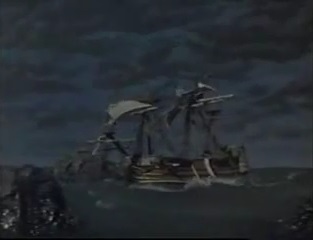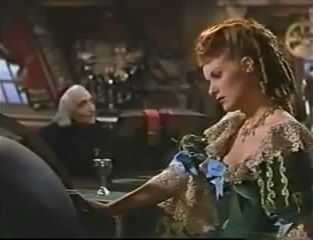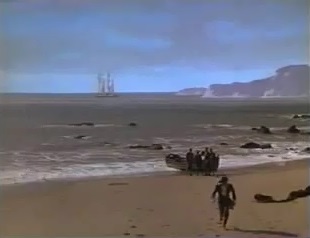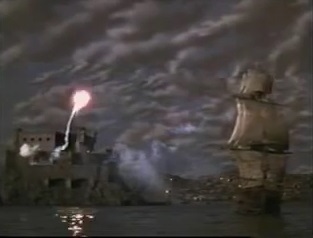An allegory of faith on a rigorous model from very
ancient times but set before the Great War.
A Paris sewerman makes the wager (five francs
twice) and gets the reward of a streetcleaning job. He redeems his soul from bondage
thus far and finds it heaven.
His regiment is called, the war
strikes him blind but now his faith is sure, he sees with the eyes of the soul.
That is the tenor of it, a plain
romance of the eleventh hour, day, and month.
Among its just accolades is the
poster for it placed by Ozu in Days of
Youth, a college comedy.
A
Farewell to Arms
There is
a wonderful little joke that sets the thing up, Cooper (or “Baby,”
as he is called) is discussing architecture in its relation to the arch of a
high-heeled shoe. There is an air raid (filmed with a flash of Fellini) and he
finds himself in a shelter continuing his monologue while holding the bare foot
of a very alarmed Helen Hayes.
The resolution is
exactly that achieved by Nunnally Johnson’s The Man in the Gray
Flannel Suit, a thing very like Blake’s meditations on the Ancient of
Days and the New Jerusalem, say. The onrushing speed
of Hemingway’s conclusion is encapsulated by introducing Liszt and then
Wagner to give a musical effect, a sketching-in or magician’s patter.
The subjective
camera sequence in the hospital, culminating in Helen Hayes’ kiss,
provoked the great fantasia in Peckinpah’s Cross of Iron, and was
re-created as a famous episode of the television series M*A*S*H.
Man’s Castle
The direction is
a carefully-studied mixture of the beautifully precise and the woefully inexact
(I Cor. 1:26 is cited in this context). Take the first shot, a view over the
lake in Central Park, repeated in a process shot immediately. Two things are
sought, the dramatic representation of what it means to be on the bottom, and
the effect of the last scene. Throughout, the actors carry their parts
effectively, Walter Connolly has a rare turn anticipating Strother Martin, and
Spencer Tracy takes command of key scenes.
The joke of the
title is he has no home, only temporary digs in a Shantytown. Capra modeled the
Colonel in Meet John Doe on his irascible independence. When he takes a
job for two hours to make a payment on his mistress’s stove, he wears a
clown costume and stilts.
He is first seen
wearing white tie and tails, filling in for a friend with a shirtfront that
lights up to advertise a brand of coffee. Later, he accepts an offer to serve a
summons, evading the subject’s bodyguards by stepping from a box seat
onto the stage where she is singing “Surprise” (they beset him in
the wings).
This is enough to
give a complete picture of the situation, but there is more. On stilts for
advertising purposes, he strides down a New York street, pausing at a
second-story window to deliver a baseball he has signed “Babe Ruth”
to little Dickie Moore, and at another window farther down the street where he
hears the chanteuse rehearsing a number with piano accompaniment. She invites
him to her tower apartment, but a Shantytown neighbor gets wind of the
rendezvous and apprises the mistress, hoping to make time himself, though
without success.
The conclusion
has the neighbor wheedle the hero into joining him to rob the toy company where
the neighbor once worked, and where Connolly as the Shantytown preacher (who
grows zinnias in front of his shack, with great care) has a job as night
watchman. The hero’s mistress, whom he picked up starving in the park, is
now pregnant, and he would prefer to leave her something before catching his
freight.
He is shot by the
watchman before they have a chance to talk, the neighbor escapes and calls the
police, the wound isn’t serious (and the right safe is in another
building). After jumping one freight and changing his mind, after the neighbor
is shot to death by a drunken lady of Shantytown who’s wise to him, with
the police due to arrive at any moment, a brainstorm is presented to the hero.
He and his mistress both board a freight train bound for elsewhere.
Aside from the
Capra already mentioned, there is a strong influence on or around
Kershner’s A Fine Madness and Kurosawa’s Dodes’ka-den.
History Is Made At Night
The Titanic (called Princess Irene) remains afloat at the end, the lady having refused
to fly the Hindenburg, and that is
the whole line of it, or as the greatest chef in all the world says here,
“whaddyou suppose from those?”
Time Out
says, “a bizarre movie”. The Catholic News Service Media Review
Office says, “overly contrived”.
The film has
generally suffered from critical incomprehension,
always on the same line (see above), thus Halliwell’s
Film Guide (citing Variety and
Pauline Kael in The New Yorker).
Mannequin
A company
acquisition is seen in business terms as a marriage (Lubin has the significant
variation, Impact).
Out of Hester Street
to the penthouse, expansion and European honeymoon (Spencer Tracy). The poor
working girl (Joan Crawford) has all she wants, still her husband’s a
heel. She marries the millionaire, but there’s a kind of debt obligation,
the workers strike, his fortunes collapse. She sticks with him, though,
she’ll sell the jewelry he lavished on her, he can start over.
A very droll
picture of the business world, labor, a Harvard business advisor, the idle poor, and unromantic Hester Street.
Three Comrades
From the
Armistice to Kristallnacht takes five minutes, yet
the work is said to limp from its many cuts. Fitzgerald signed, Mankiewicz
produced. “Give a hoodlum a club and he’ll run anything.”
At the New York Times, Frank S. Nugent vouched
for the work, “a superlatively fine picture, obviously one of
1938’s best ten, and not one to be missed.” Variety was perplexed, “all the poetry in the dialog about
falling leaves and the approaching winter only further confuses.” Dave Kehr (Chicago Reader)
echoes Nugent on “glamour”. The Catholic News Service Media Review
Office sees a “sentimental adaptation” in which “viewers
today” will see “the breeding ground of fascism.” Tom Milne (Time Out) waxed something,
“impossibly pure, absurdly naïve, yet magically tender.” Leonard Maltin
takes the trick, “beautifully poignant film... excellent performances all
around.”
Lang remembers it
all in Die tausend
Augen des Dr. Mabuse.
A hundred
felicities of expression and several scene constructions of the happiest sort
suggest the hand of Fitzgerald, and there is the gibus springing to life.
The grinning
assassin disappears into the house and dies, unsmiling, to the sound of one of
the choruses heard throughout, the Hallelujah.
Borzage has this
from A Farewell to Arms. Halliwell’s Film Guide argues the
cuts, cites the very acute National Board of Review in praise and very dull TIME seconding Variety.
The Shining Hour
Big Wisconsin
dairyman (Melvyn Douglas) marries New York hoofer (Joan Crawford), brings her
home to provincial snob sister (Fay Bainter), self-described
“neurotic” pianist brother (Robert Young), and brother’s soon
forsaken wife (Margaret Sullavan).
Hoofer’s
nightclub act is Chopin w/dancing partner to four pianos and band à la Les Noces.
After many melodramatic
complications, bride and groom go to South America.
Borzage plays
this like Lubitsch’s That Uncertain
Feeling (Kiss Me Again), drunk to
please the wife’s divorce lawyer, Borzage is a
butter-and-egg man.
Strange Cargo
A certain evil
must be addressed by Jesus Christ alone, and him crucified (so stated in
Capra’s Meet John Doe).
Film directors
make the best critics insofar as Godard points out that the best criticism is a
film of your own, Dieterle’s Fashions
of 1934 is illuminated here on the province of crime,
Koster’s The Power and the Prize
clarifies the sacrifice.
B.R. Crisler (New York
Times), “should be much more portentous”. Variety, “not successful.” Geoff Andrew (Time
Out), “the uplifting power of love.”
Leonard Maltin
says, “not for all tastes.”
The Mortal Storm
It is now
possible for Borzage to tell the story in plain terms, once the last
negotiations have ceased, and so this is Three
Comrades once again, still not wearing kid gloves but a little more direct.
The point is to amplify the blessing on humanity and place it in the hands of
God for the duration, and this is once again a consideration of the theme
treated in A Farewell to Arms, an
acutely observed portrayal of the Nazi menace starting on the day Hitler took
power to wide acclaim. By the midpoint Borzage has the terror well ensconced as
the earlier pronouncements of Hitler’s adherents are made a “new
order”, then there is the hopeless concentration camp, internal exile and
escape (cp. The
Passage, dir. J. Lee Thompson). Crowther (New York
Times) saw “an exposition of heroic stoicism” and considered it
“magnificently directed and acted” on “the most tragic human
drama of our day... one of the most harrowing and inflammatory fictions ever
placed upon the screen.” Variety,
“a slugging indictment of the political and social theories advanced by
Hitler... when the paperhanger gained control of the government.” Tom
Milne (Time Out) credits
“almost the entire film” to Victor Saville and finds the result
“invariably slightly embarrassing”. Halliwell’s Film Guide (“solid anti-Nazi
melodrama”) reports that Goebbels had a fit.
Stage Door Canteen
A morale-raiser
that puts New York on the map (a “curio” to Dave Kehr, Chicago Reader).
It sweeps aside
all obstacles, Katharine Cornell is Juliet dishing out chow unto “thy
gracious self”, she had not appeared on film,
just outdoing Lunt & Fontanne on KP.
The rest unfolds
and unfolds and unfolds, no New York, no stage career, or else the real one,
some time off while the war is on and the duty is more than to a Broadway
producer.
Ray
Bolger’s manual of arms, Ethel Merman’s singing, Gracie Fields
shooting down the Japs, Count Basie and Ethel Waters in
“Quicksand”, Benny Goodman and Peggy Lee summing it all up,
contingent on the grace of God and the fortunes of war for any man’s
life, the whole country at war, the artists and craftsmen doing their part.
Bosley Crowther
of the New York Times thought
“this may not be the picture to arouse the sophisticates,” God
bless him.
Variety,
“plenty boffo.”
“Nothing as
a picture” (Halliwell’s Film
Guide, citing Agee in agreement).
The Spanish Main

A pilgrim to the
New World halted at the court of the viceroy in Cartagena
is as Moses before Pharaoh, a slave. Escape and return
as the Barracuda, a scourge (cf.
Polanski’s Pirates), “the
existing order does not meet with his favor... a malcontent indeed.” Paul Henreid, following Negulesco’s The Conspirators (and a bit in Daves’
Hollywood Canteen). Don Alvarado, a
portrait of sublimity by Walter Slezak the year after
Lifeboat (dir. Alfred Hitchcock). A condesa his
bride-to-be, Maureen O’Hara two years after Renoir’s This Land Is Mine (with Slezak).
Polanski remembers
the distinctive undercranking on action in Macbeth.

Screenplay by
George Worthington Yates and Herman J. Mankiewicz out of Aeneas MacKenzie, cinematography George Barnes (the Academy Award
for color went to Leon Shamroy with Leave Her to Heaven, dir. John M. Stahl),
score Hanns Eisler.
Andrew Sarris (The American Cinema), “Borzage’s
objection to Hitler was a curious one. What Hitler and
all tyrants represented most reprehensibly was an invasion of the emotional
privacy of individuals, particularly lovers, those blessed creatures gifted
with luminous rapport.”

Bosley Crowther of the New
York Times, “like water out of a tap.” Variety, “swaggering pirates and
beautiful girls.” Leonard Maltin,
“colorful escapism”. Geoff Andrew (Time Out), “no scope for Borzage’s
gorgeously swooning, religiose romanticism in this swashbuckler.” Hal Erickson (All
Movie Guide), “cynical”. Catholic News
Service Media Review Office, “plenty
of romance, double-dealing intrigue and colorful action with battling galleons,
crossed swords and a dangerous lady pirate.” Halliwell’s Film Guide, “for
the easily amused.”
